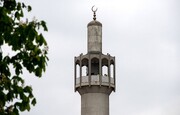Hawzah News Agency – Muslims in the US state of Minnesota have successfully appealed for two people involved in bombing a mosque to be granted reduced prison sentences after they voiced remorse for their crime.
Leaders from the Dar al-Farooq Islamic Center in Bloomington wrote to Judge Donovan W Frank ahead of Tuesday's sentencing, appealing for the court to exercise compassion and grant reduced jail terms to Michael McWhorter and Joe Morri.
McWhorter, Morri and Emily Claire Hari - formally known as Michael Hari - bombed the Dar al-Farooq Islamic Center in 2017 in an attack which caused significant damage to the mosque but did not harm worshippers.
On Tuesday, McWhorter and Morri were sentenced to 16 and 14 years in prison respectively. In September, Hari was sentenced to 53 years.
The trio were part of a white supremacist terrorist militia named The White Rabbits, established in Clarence, Illinois.
"Our community continues to digest and recover from this instance of hate, but we will not let it change our outlook for the future," the letter read.
"The harm that was done is real, the crime that was committed is real, the horror of what happened is real, but what's also real is our opportunity to offer real forgiveness, and lead by example. We believe that only through forgiveness can we have any real chance to heal and move forward."
What happened?
On 5 August 2017, at around 5:00 am, Hari, Morris and McWhorter used a sledgehammer to break the window at the Islamic centre.
According to the Justice Department, they threw a plastic container containing a mixture of diesel fuel and gasoline into the Dar al-Farooq office, and then lit the fuse on a 20-pound (9kg) black powder pipe bomb. They threw the bomb through the broken window and escaped.
At the time, the mosque's executive director, Mohamed Omar, was taking a nap in the office next door. He told Middle East Eye he had been working all night and fell asleep on a sofa. He woke up to a loud bang and assumed he was hallucinating. He soon found himself confused and on the ground when a mosque worker came inside and pulled him out.
Board member Abulahi Farah recalled how he was unable to make it to the mosque for fajr (dawn prayers), as he was getting his children ready for weekend school.
He received a text message at the time saying: "Come quick, we got bombed." He thought it must have been mistakenly autocorrected, and called Omar, who didn't pick up. Another congregant eventually told him the mosque was on fire .
"I saw Mohamed sitting on the pavement on the side of the gymnasium. I told him 'don't call anyone'. Because at that moment, we were afraid. We had gotten so used to hiding. When anything bad happened, all we did was hide because we didn’t want any media attention. Because all attention was bad," Farah told MEE. "But Mohamed looked at me and said ‘What are you talking about? I almost died’, and he walked away with disgust."
According to the Justice Department, the blast caused extensive damage to the office and caused extensive fire and smoke damage. At the time of the bombing, there were several worshippers already inside for fajr prayers. But no one was hurt.
Where it all began
Farah says the local Muslim community had been living in fear long before the mosque opened in 2011. They had felt a huge pushback from the mostly white suburban community when they purchased the former elementary school in the hopes of building a mosque.
Farah said, however, that those who opposed the mosque were also against a Walmart moving into the neighbourhood.
"They felt that low-income people would move in with a Walmart and with our mosque. The majority of the people they were afraid of moving in were immigrants, Black immigrants. We matched their fight, and they continued to drive that wrench," he said.
Immediately after the mosque was established, several people from the neighbourhood created a blog comparing the neighbourhood "before Black people and Muslims and after", Omar explained. They'd frequently accuse the mosque congregants of being jihadists, he said.
Every Friday, neighbours would stand outside the mosque, Omar added, and take videos and photos, harassing congregants as they would enter the mosque for prayers.
Local media site Sahan Journal reported that a Confederate flag was raised on a tree near the mosque.
Following the bombing, the administration of President Donald Trump stayed silent, with Sebastian Gorka, who served as a deputy assistant to the president, saying the White House would "wait and see" in case the attack turned out to be a hoax.
"It was everything you don't want to hear at that point in your life. It made everyone suspect us. We were sitting in fear and we were hopeless," Omar said.
While he believes retribution is important, he said it was important that the perpetrators were rehabilitated and reintegrated into society.
"This closed another chapter of our lives. We can not live this way. We forgave so that we can heal together. This is what you call restorative justice," Omar said.
"If you do not contribute the good, and just take revenge, then the whole world would shrink. We do disagree, but at the end of the day, we cannot make that into a conflict and damage one another. We want to live a life that models our faith and principles, with confidence."



Your Comment